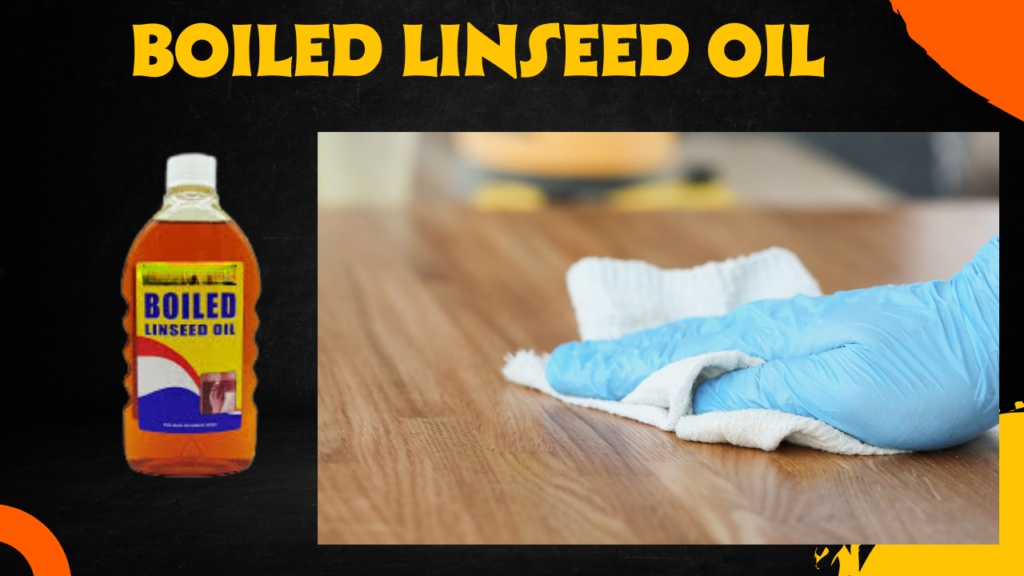
Boiled Linseed Oil (BLO) is a popular finish that has been used for centuries by woodworkers, painters and craftsmen. Long known for its ability to penetrate deep into wood, BLO will bring out the beauty of the wood while providing lasting protection. BLO brings out the natural wood tones and acts as a simple treatment that is easy to use and apply.
In this article, I will cover what boiled linseed oil is, what it is made of the benefits, ways to apply it the right way, safety tips and practical applications to get an in-depth understanding of this golden liquid.
What Is Boiled Linseed Oil ?
Boiled linseed oil is extracted from the seeds of the flax plant. The seeds are pressed to extract raw linseed oil, a viscous liquid that dries slowly. People commonly use this oil to treat or finish wood. The “boiled” in boiled linseed oil could be misleading you because the oil is not actually boiled but it is chemically treated and heated to help it to dry faster.
This modification usually involves heating the oil (sometimes twice in the case of double boiled linseed oil) and adding metallic drying agents known as siccatives (such as metallic salts) to stimulate oxidation when exposed to air.
These procedures will help to cut down the drying time. Raw linseed oil can take many weeks or even months to completely cure (especially in cool weather) whereas boiled linseed oil can dry into a tough and semi-gloss coating in as little as 12 – 24 hours which makes for a much more practical finishing technique.
How Is Boiled Linseed Oil Made ?
Boiled linseed oil is manufactured by boiling the raw linseed oil in a double boiler to preclude direct heating which may cause burning. In order to make double boiled linseed oil, the oil is heated twice: once to extract it from the flax seed and a second time with the addition of drying agents.
These metallic salts are catalysts for the oil’s reaction to the atmosphere’s oxygen and solidize faster upon application. Today’s solutions use safe substitutes for the toxic drying agents of the past (lead oxide).
This process turns the oil into a heavier, quick-drying film that carries oil deep into the wood to create a satin finish that is tough and resists water and alcohol to provide a long-lasting protection.
Benefits and Properties of Boiled Linseed Oil
Dries Quickly: Boiled linseed oil dries faster than raw linseed oil, normally within 24 hours to varying degree of penetration. This means projects are able to be turned around faster.
Deeply Penetrating: The oil penetrates deep into the wood fibers, the wood is enriched and hardened, it does not become greasy, but makes the wood rich and retain its natural look that most substances would fail to achieve.
More Beautiful: BLO brings out the grain of the wood and gives a warm rich satin (in between matte and semi-gloss) finish as opposed to a wet slick finish without staining the wood. It darkens wood just a bit, highlighting character and texture.
Multipurpose: It is ideal for use on numerous wood types and can be applied to porous stone, terracotta and even metal to great effectiveness in preventing oxidation.
Non-Toxic Alternatives: Well-made and well-cured BLO is generally safe as a finish for furniture, kitchen utensils and toys, which can’t be said of many synthetic finishes.
Durable Protection: The oil creates a barrier that lock out moisture to protect the wood from the inside-out, and it has a high UV-resistant to stop any sun damage to the wood.
How to Use Boiled Linseed Oil: Step-by-Step Application Guide
Preparing the Surface: The wood must be clean, dry and free of old finishes, wax and oils. It is recommended to sand smooth (220-320 grain/report) and remove the dust.
Test First: It’s always a good idea to test the oil’s appearance on a hidden section of the wood to see what the effects will be on color and texture.
Oil it Up: Apply the oil liberally with a clean, dry, lint-free cloth, foam brush or an applicator pad along the grain. Leave it to dry for 15-30 minutes.
Wipe Away Excess: After penetration, wipe away any excess oil. This will also keep your finish from becoming tacky, or drying unevenly and ending up splotchy.
Dry Time: Leave the oil to dry for at least 24 hours. Dry times are dependent on temperature and humidity, so be sure to have proper ventilation.
Repeat Coats: Apply 2-3 coats to achieve coverage. In between coats, lightly sand with a 400-600 grit sand paper to taking out imperfections and aid in adhesion.
Final Cure: After final coat is applied, let cure for a minimum of 48 hours. End curing may require up to three weeks.
Maintenance: Reapply boiled linseed oil every year or when the wood begins to look dry or worn.
Key Differences Between Raw and Boiled Linseed Oil
| Feature | Raw Linseed Oil | Boiled Linseed Oil |
|---|---|---|
| Drying Time | Several days to weeks | Few hours to a day |
| Composition | Pure, natural | Contains drying agents |
| Uses | Food, medicine, oil painting | Wood finishing, metal protection |
| Toxicity | Non-toxic | Can contain chemicals |
Boiled linseed oil is not suitable for consumption but is widely used in wood finishing, metal protection, and industrial applications.
Also read:
Hidden Power of Polymerised Linseed Oil Revealed!
Safety Considerations When Using Boiled Linseed Oil
Boiled linseed oil is great for finishing wood, but don’t leave a soaked rag lying around; it could be a fire hazard. Blo cures by oxidation, a chemical process that creates heat. When BLO soaked rags are bunched up or balled up with no air flow, the heat can build up and cause spontaneous combustion.
To prevent fires:
Storage: Store in metal containers for a very long time. Avoid storing in plastic containers.
Rags: Spread oily rags out flat on a non-combustible surface and allow to dry completely or immerse in water.
Disposal: After use, wash cloths in warm soapy water and store in fireproof containers outside or metal cans that have lids or old BBQ grills.
Don’t Wad It: Don’t bunch or wad oily rags together, as doing so can reduce airflow and generate heat.
These safety measures will greatly mitigate the fire hazards, so that boiled linseed oil becomes safe to use in workshops and in residential settings.
Practical Applications of Boiled Linseed Oil
Wood Furniture: BLO revives and shields indoor and outdoor furniture, your furniture will be the showplace of your home.
Wood Flooring & Countertops: Great for bringing old, dry, wooden items back to life, while rejuvenating and replenishing lost oils and breathablity.
Restoration Projects: Excellent for restoring old, dried-out wooden items by replenishing lost oils and breathability.
Metal Protection: Applied thinly, BLO prevents rust and oxidation on tool surfaces, cast iron, and metal components.
Porous Stone and Terracotta: Keeps porous materials sealed and protected, extending their lifespan.
FAQ About Boiled Linseed Oil
Q: Does boiled linseed oil stain wood?
A: Boiled linseed oil is not a stain, but it will make wood a little darker. This helps to show off the wood’s natural grain and color better.
Q: Can I use BLO on exterior oak wood?
A: It is not a good idea for exterior oak, in general, because the oak is so porous that BLO may dry too slowly and raise the risk for mildew to form.
Q: Is boiled linseed oil toxic?
A: As long as it’s cured and used properly, BLO is believed to be safe for around the home, including children’s furniture and kitchen items.
Q: How long does boiled linseed oil last once opened?
A: When stored carefully in a cool, dry place, unopened BLO will last for many years; after opening, use within approximately 3 years for best results.
Final Thoughts
Boiled Linseed Oil is a classic wood finish and natural protectant that is produced from the seed of the flax plant and processed so that it will dry quicker than raw linseed oil. Its chemical treatment to quicken drying time means that it is more suitable for household use than raw linseed oil, and it can also be used on metals and porous stones. It does,however, have to be treated with care and caution as it’s flammable and might spontaneously combust.
For woodworkers, DIY enthusiasts, and craftsmen looking for a time-tested, non-toxic, and effective finish, boiled linseed oil offers an unmatched combination of beauty and longevity when applied and maintained properly.

